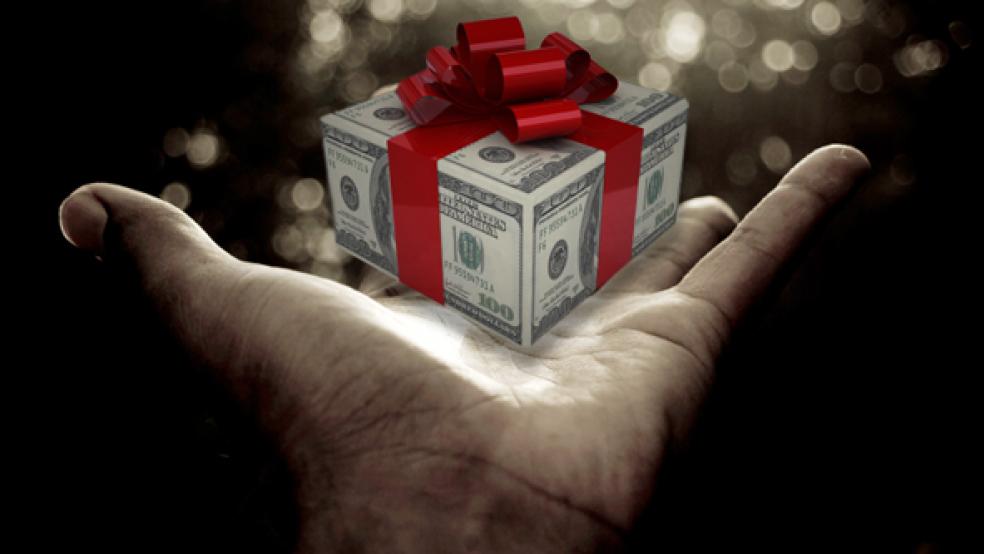First, Samantha Kemp-Jackson started noticing something unusual at the local grocery store. Then it started happening to the Toronto mom of four at the department store. Then the liquor store. Then, pretty much everywhere else.
She was getting hit up for a charitable donation at pretty much every cash register she encountered. And it was driving her bananas. "I'm a big supporter of charities, but I think this is a totally unfair way of gathering funds," says Kemp-Jackson, a communications executive who also runs a parenting blog.
Related: Tax Tips - 3 Charitable Deduction Traps to Avoid
"They're relying on the fact that you're caught off-guard, and embarrassed, and don't want to look like Ebenezer Scrooge to the people behind you in line," adds Kemp-Jackson. "It's an ambush - and I don't think that's cool."
Cool or not, consumers are getting used to the increasing prevalence of checkout charity. An analysis of more than 60 of the most prominent such fundraising campaigns found that they brought in $358 million in 2012, according to consulting firm Cause Marketing Forum.
Among the companies in the report that fundraised for charity at the cash register were boldface names like eBay, Walmart and McDonald's.
Indeed, over the almost 30 years leading up to the Cause Marketing Forum report, checkout charity proceeds amounted to an eye-popping $2.3 billion.
"It's becoming increasingly common for stores, because there's a huge simplicity about it," says Eileen Heisman, president and chief executive officer of National Philanthropic Trust in Jenkintown, Pennsylvania.
Related: Why Everything You Know About Charitable Giving Is Wrong
"You already have your wallet out, and you're already doing a financial transaction," Heisman says. "It's an easy way to capture small amounts of money from lots of people. But not everybody likes it."
Indeed. One main objection from potential givers: It requires a snap decision, which doesn't give you any time at all to properly evaluate the charity or how the funds are going to be used. With "10 people behind you in line," Heisman admits, you're unlikely to be doing any in-depth research. Meanwhile, the cashier, instructed by his or her boss to ask everyone for a donation, probably isn't going to be a great information resource.
As a result, checkout charity has become a subject that gets people royally pissed off. When Kemp-Jackson discussed her opinion on a Canadian radio show recently, she was surprised at the vitriol that came spewing out of almost everybody.
"I didn't realize it was going to be such a big thing," she says. "Everyone was saying, 'I just can't stand it.' It makes people lose their minds."
In fact, when CBC Radio did an online poll on the subject in the aftermath, more than 82 percent of respondents growled that checkout charity feels like an "ambush."
Related: Who's More Generous, Liberals or Conservatives?
Now, more charitable giving certainly is a positive thing for society as a whole. Americans don't give as much as they probably should: On average, they earmark a modest 3 percent of their incomes for charity, according to The Chronicle of Philanthropy.
Point of Sale Fundraising
So the motivation behind so-called 'point-of-sale' fundraising is undoubtedly positive. But with so many negative emotions being kindled, why are so many store chains opting for this particular method?
"One, because it's so easy to execute," says Perry Yeatman, a principal with consulting firm Mission Measurement, which advises companies on how to maximize their social impact. "And two, when you think about it, the company gets all the benefit of giving to charity on the consumer dollar."
On a personal level, though, Yeatman too bristles at these fundraising initiatives. "I feel ambushed, and guilty, and angry at the store for putting me in that position," she says. "So I stick to my guns, and I don't give."
Related: U.S. Tied for First Place As Most Generous to Charities
It's not like you're going to see any whopping tax benefit from your store-based generosity. Theoretically, you could save every single shop receipt where you chipped in a dollar at the register over the course of a year, and present it to your accountant for your tax filing. But practically, very few people are so organized or willing to undertake a task so "labor-intensive," Heisman says.
Despite the collective resentment, though, checkout charity is unlikely to be going anywhere. After all, it's a captive moment where your credit card is out and the cashier has your undivided attention. In a world of a million distractions, it's one of the few remaining ways to cut through the noise.
And compared to other, more challenging fundraising avenues - whether it's ringing bells on the sidewalk for the Salvation Army, or hosting a rubber-chicken dinner - simply asking consumers at the register is a no-brainer for charities.
Just remember that it's okay to say no. It doesn't mean you're a bad person. And it doesn't mean that people behind you in line will think you're a monster; in fact, they might be just as annoyed as you are.
"I absolutely believe in charity," Kemp-Jackson says. "But not like that."


